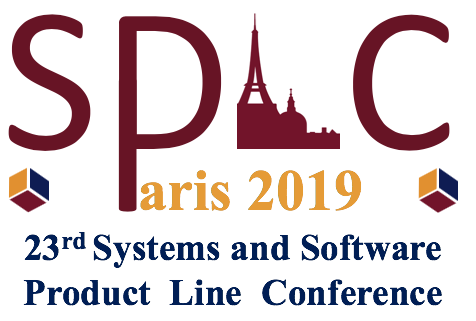For more almost two decades, organizations have been taking advantage of systems and software product line practices to achieve business advantages in time-to-market, cost, quality, and agility. They have encountered a wide range of challenges, successes, and adaptations in their systems and software product line experience. In addition, more and more organizations are opening up products and platforms to external contributions, to leverage the innovation power and network effects of software ecosystems. We are seeking contributions from industry that share their challenges, successes, and adaptations of existing practices in all stages of maturity.
IMPORTANT DATES (AOE TIME)
- Abstract submission: March 26, 2019 (extended).
- Paper submission: April 2, 2019 (extended).
- Notification: May 14, 2019.
- Camera-ready paper: June 25, 2019.
- Conference: September 9-13, 2019.
TOPICS
We solicit papers on the following topics (but not limited to):
- Introducing PLE to an organization, migration to a product line approach
- Business ecosystems around product line engineering
- Processes and methods, e.g., combining PLE with DevOps and agile practices
- Scoping of product/solution portfolios and assets
- Architecture, design, and implementation of product lines
- Variability management across all stages of the life-cycle
- Quality and non-functional properties in PLE and software ecosystems
- PLE tools and methods for guidance and governance
- Product line testing and validation
- Version and configuration management
- Disruptive innovations and their effects on software product lines
We explicitly encourage papers reporting on:
- Applications of product line concepts in emerging domains (e.g., Cyber-Physical Systems, Industry 4.0, IoT, Cloud Computing, 3D printing) and
- Application of novel concepts (e.g., from data analysis, machine learning) in a product line context.
SUBMISSIONS
- Full papers – Reporting experience from industrial applications and projects. The papers in this category must provide sufficient context of the problems identified or addressed, describe clear requirements and/or experience in solving them, provide an assessment of benefits and drawbacks or other lessons learned, and explain why the contribution is innovative or valuable for others.
- Short papers – Describing, from an industrial perspective, early returns on new product line and software ecosystem applications and projects, or other shorter industry topics of interest.
The page limit is 10 pages for full papers and 5 pages for short papers, not including references (2 extra pages maximum). Submissions must follow the 2019 ACM Master Article Template and will be reviewed by at least three members of the program committee for the Industrial Systems and Software Product Lines Track.
\documentclass[sigconf]{acmart}
\acmConference[SPLC'19]{23rd International Systems and Software Product Line Conference}{9--13 September, 2019}{Paris, France}
The SPLC proceedings will be published in the ACM Digital Library. SPLC is ranked as a top conference.
At least one author of each accepted submission must register and attend SPLC 2019 for the submission to be published.
Submissions should be sent using EasyChair: https://easychair.org/conferences/?conf=splc2019
ARTIFACT EVALUATION
Authors of accepted papers are invited to submit for evaluation and publication artifacts associated with the paper. According to ACM’s “Result and Artifact Review and Badging” policy, an “artifact” is “a digital object that was either created by the authors to be used as part of the study or generated by the experiment itself […] software systems, scripts used to run experiments, input datasets, raw data collected in the experiment, or scripts used to analyze results”.
Accepted artifacts will receive one of the following badges on the first page of the paper, table of contents, and in the ACM Digital Library:
- Artifacts Evaluated – Functional: The artifacts are complete, well-documented and allow to obtain the same results as the paper.
- Artifacts Evaluated – Reusable: As above, but the artifacts are of such a high quality that they can be reused as is on other data sets, or for other purposes.
The presentation of a paper associated with an accepted artifact will get 5 extra minutes. The authors must ensure that the artifacts are available from a stable URL or DOI. Please note that these badges exclude proprietary data or tools.
Authors of accepted papers who want to publish an artifact should do that via Easychair (select the Research Artifacts track) by submitting a PDF that contains a stable URL (or DOI) to the artifacts and that explains the steps and general instructions to execute/analyze the artifact. The deadline for submission is the paper camera-ready deadline.



